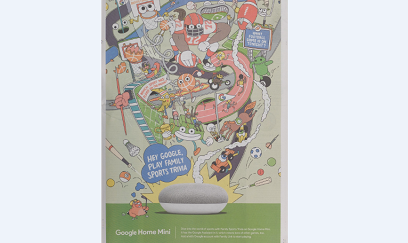UPDATE: NYT Says Kids Section Ads Meet Standards

The smarter way to stay on top of broadcasting and cable industry. Sign up below
You are now subscribed
Your newsletter sign-up was successful
Consumer groups are telling the New York Times that it's time to drop the ads in its New York Times for Kids, calling them deceptive and blurring the line between and paid content. The Times disputes the characterization.
That complaint came in a letter to Times Chairman Arthur Sulzberger Jr. responding to a Nov. 19 supplements in which almost a third of the pages (5 of 16) were ads for the Google Home Mini, an internet-connected device they say could "endanger" those kids privacy and welfare.
They say the ads were "disguised" as puzzles and so violate the(Better Business Bureau's) Children's Advertising Review Unit's voluntary guidelines, which mandate a "clear distinction" between advertising and content--the groups sent a copy of the letter to the CARU ad review unit and Google.
David Monahan, campaign manager for Campaign for a Commercial-Free Childhood, told B&C that he had contacted CARU Wednesday morning and asked it to investigate.
They point out in the letter that the Times plans to make the supplement a monthly feature starting in the new year.
The letter's tone was cordial. The groups applauded the idea of a children's supplement, but not as a "Trojan Horse" for Google Ads.
"The ads were brightly colorful cartoon drawings, with interwoven questions in bubbles meant to engage children –a visual style quite similar to much of the editorial content of the supplement. Each ad was disguised as a puzzle for kids, with this question at the bottom referring to Google characters embedded in the ads: “Can you find the donut, G, and Android in each drawing?”
"Advertising helps support our ability to create special sections like this one," asid a Times spokesperson. "In fact, our first special kids section, which published in May 2017, also contained ads. The ads in question met our advertising acceptability standards and we do not believe there is any confusion that these pages are, in fact, ads."
To be fair, the groups believe that all marketing directed to children is inherently unfair and that the Google Home product is inherently harmful to children given that Google can share children's info to third parties for the purposes of marketing to kids.
Among those signing on to the letter were Campaign for a Commercial-Free Childhood (CCFC), the Center for Digital Democracy, Consumer Action, the Consumer Federation of America, Consumer Watchdog.
The smarter way to stay on top of broadcasting and cable industry. Sign up below
“The Times Company must stop trying to monetize children in order to build new revenues for its brand,” said Jeff Chester, executive director of the Center for Digital Democracy. “It diminishes its reputation by engaging in unprofessional practices towards kids in order to generate sales of ads from Google. The Times is also placing children’s privacy at risk by promoting Google’s vast commercial surveillance apparatus.”
As to the Times' defense.
"It’s disingenuous for the Times to say there’s no confusion about the Google ads which ran in The Times For Kids," said Monahan. "Young kids don’t even understand the persuasive intent of marketing—they are certainly misled when it’s hidden in a cartoon puzzle. Children’s Advertising Review Unit standards ban advertising in a manner that 'blurs the distinction between advertising and program/editorial content in ways that would be misleading to children.' These Google Home cartoons obliterated that distinction."
Contributing editor John Eggerton has been an editor and/or writer on media regulation, legislation and policy for over four decades, including covering the FCC, FTC, Congress, the major media trade associations, and the federal courts. In addition to Multichannel News and Broadcasting + Cable, his work has appeared in Radio World, TV Technology, TV Fax, This Week in Consumer Electronics, Variety and the Encyclopedia Britannica.

